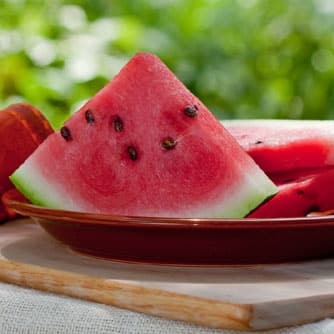Watermelon is a rich edible natural source of L-citrulline, a compound that is closely related to L-arginine, which is crucial to the formation of nitric oxide, which helps to widen blood vessels and thereby mediate blood pressure. Arturo Figueroa, from Florida State University (Florida, USA), and colleagues enrolled four men and five women, average age 54 years, with pre-hypertension (134/77 ± 5/3 mm Hg), randomly assigned to 6 weeks of watermelon supplementation or placebo, followed by a 4-week washout period and then crossover. The team found that supplementation with 6 grams of L-citrulline from watermelon improved arterial function and lowered aortic blood pressure in all nine pre-hypertensive subjects. Specifically, L-citrulline supplementation significantly decreased the second systolic peak, and did not alter heart rate, reflection time, or aortic pulse wave velocity. Concluding that: “This pilot study shows that watermelon supplementation improves aortic hemodynamics through a decrease in the amplitude of the reflected wave in individuals with prehypertension,” the researchers posit that L-citrulline supplementation (from watermelon) could lead to reduced doses of antihypertensive drugs being needed to control blood pressure, or could even prevent progression from pre-hypertension to hypertension.
Watermelon Compounds Help to Reduce Blood Pressure
Arturo Figueroa, Marcos A. Sanchez-Gonzalez, Penelope M. Perkins-Veazie, Bahram H. Arjmandi. “Effects of Watermelon Supplementation on Aortic Blood Pressure and Wave Reflection in Individuals With Prehypertension: A Pilot Study.” American Journal of Hypertension, 8 July 2010; doi:10.1038/ajh.2010.142.
RELATED ARTICLES




